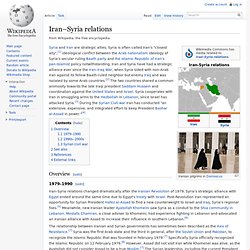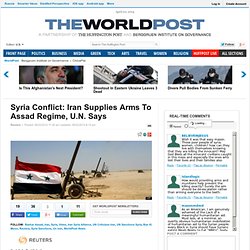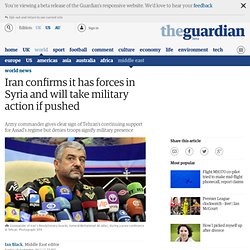

Iran–Syria relations. Syria and Iran are strategic allies.

Syria is often called Iran's "closest ally",[1] ideological conflict between the Arab nationalism ideology of Syria's secular ruling Baath party and the Islamic Republic of Iran's pan-Islamist policy notwithstanding. Iran and Syria have had a strategic alliance ever since the Iran–Iraq War, when Syria sided with non-Arab Iran against its fellow Baath-ruled neighbor but enemy Iraq and was isolated by some Arab countries.[2] The two countries shared a common animosity towards the late Iraqi president Saddam Hussein and coordination against the United States and Israel.
Syria cooperates with Iran in smuggling arms to the Hezbollah in Lebanon, since Israel has attacked Syria.[3] During the Syrian Civil war Iran has conducted "an extensive, expensive, and integrated effort to keep President Bashar al-Assad in power. "[4] Overview[edit] 1979–1990[edit] Iran–Syria relations changed dramatically after the Iranian Revolution of 1979. 1990s–2000s[edit]
Syria Conflict: Iran Supplies Arms To Assad Regime, U.N. Says. By Michelle Nichols UNITED NATIONS, Aug 22 (Reuters) - Iran appears to be supplying Syria with weapons, the United Nations said on Wednesday, as the 17-month conflict that began as a popular uprising against Syrian President Bashar al-Assad slides deeper into civil war.

The U.N. accusation backs charges by Western officials that Iran is providing funds, weapons and intelligence support to Assad in his bid to crush the opposition. Syrian rebels also say Tehran has sent Revolutionary Guards and Hezbollah fighters. "The Secretary-General has repeatedly expressed his concern about the arms flows to the two parties in Syria, which in some cases appear to violate resolution 1747 passed by this council banning arms exports under Chapter 7 authority," U.N. political affairs chief Jeffrey Feltman told the U.N.
Security Council. In a prepared copy of his speech, Feltman noted that the ban was on Iranian arms exports. Next week, U.N. A U.N. Iran confirms it has forces in Syria and will take military action if pushed. Iran has confirmed for the first time that forces from its revolutionary guards corps (IRGC) are in Syria helping Bashar al-Assad's government crush rebels, and warned that it would get involved militarily if its Arab ally came under attack.

In a clear public signal of Tehran's continuing support for Assad, the commander of the Islamic republic's elite military formation said that a number of members of the IRGC's Qods force were in Syria, though General Mohammad Ali Jafari gave no further details and claimed this did not constitute "a military presence".
It was a surprisingly candid response to persistent claims by western countries, the Syrian opposition and Israel that Iran is actively helping the regime in the 18th month of a bloody war. Reports from Syriaon Sunday described government forces fighting rebels amid shelling and sniper fire in Damascus and Aleppo, as well as in Homs and Deir ez-Zor. The Local Coordination Committees, an activist network, reported 103 dead. Iran and Syria Are Committed to the Their Friendship - Connor Simpson. Why are Syria and Iran such tight allies? The Middle East is home to many unusual alliances, but one of the oddest is the enduring partnership between Syria and Iran.

Syria portrays itself as a champion of secular Arab nationalism, although in practice it is a minority-dominated military dictatorship. Iran, in contrast, rides under the banner of revolutionary Islam, although as a Persian country, it is often at odds with the Arab world, particularly since the vast majority of Iranians are Shiites, while most Arabs are Sunnis. Syrian President Bashar Assad's father and predecessor, Hafez Assad, gunned down thousands of revolutionary Islamists in the 1970s and early '80s to prevent an Islamic revolution in Syria. Iran's religious elite has often criticized Arab leaders as despots who have turned away from true Islam—a description that could easily apply to Assad's Syria.
But geopolitics has brought Iran and Syria together despite these many differences. These many common interests have come together in Lebanon.